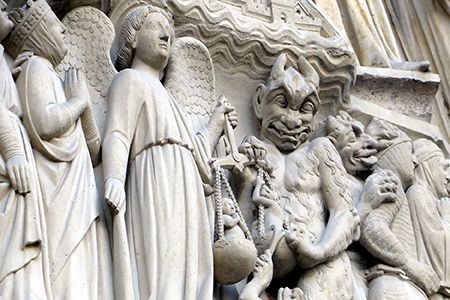 Ezekiel 34:11-12, 15-17
Ezekiel 34:11-12, 15-17
 1 Corinthians 15:20-26, 28
1 Corinthians 15:20-26, 28
 Matthew 25:31-46
Matthew 25:31-46
On the Feast of Our Lord Jesus Christ, King of the Universe, the Gospel reflection focuses on an important topic in our life: How would we be judged, and according to what criteria?
Someone may say, we will be judged according to our right beliefs, intellectual convictions, political affiliations, career success, or social status. I would argue that these are not the criteria. While these things are very much a part of our lives, it is wrong to believe that they are the criteria God uses to judge us. Nevertheless, how often the world judges us by these qualities! The secular world will applaud us if we have a high social status, will reward us if we have great intellectual achievement, and will welcome us if we have the right political affiliations.
So how would our Lord judge us? We will be judged according to our love concretely expressed, “for I was hungry and you gave me food, I was thirsty and you gave me drink, a stranger and you welcomed me, naked and you clothed me, ill and you cared for me, in prison and you visited me” (Mt 25:35-36). What Jesus says here, in Matthew 25, is not love in abstract that matters. It is not a general feeling of good will towards others, or having affection for humanity in abstract. Rather, concretely caring for a person, be in touch with him or her who does not have adequate food or drink. Do everything we have in our power, with our own hands, our own life, and our own political or social influence to help that person. Care for those people and participate in the Corporal and Spiritual Works of Mercy.
Peter Maurin, Co-Founder of the Catholic Worker movement, was born in 1877 in southern France. In his 30s, he left his home, settling in Canada for a time, and began to wander around the western provinces of Canada. He resolved to live a Franciscan life, a life of simplicity and radical poverty, doing physical labor, working with the poorest people. If he ever had the slightest surplus of money, he would give it away to those who needed it more. He was truly fulfilling Matthew 25, “whatever you did for one of these least brothers of mine, you did for me” (Mt 25:40). During this period, Peter began to formulate a social and religious philosophy, and it is directly connected to this Sunday’s Gospel passage. For most people, religion is a private, interior, spiritual matter. God, prayer, the liturgy, the spiritual life are all private and interior matters which have nothing to do with sociology, economics, or politics. But that, he concluded, did not represent the best of the Catholic tradition, because faith is meant to involve every aspect of our lives! More to it, according to the teaching of Matthew 25 Matthew 25 is right, we cannot love Jesus without loving and caring for, in every concrete way, the neediest among us. If we say we love the Lord, but are indifferent to the economic play of the poor and have no care about politics and our world, we are out of step with this radical teaching. As for Peter Maurin, it began to dawn on him that this Gospel passage was a dynamite, not just a transformation of his interior life, but also a power for the transformation of the world, in societies, politics, and economics. The problem is that most religious people have taken that dynamite, placed it inside a container, put a lid on, and sit on it. Most of us do not know the dynamite, the power we have, in the Gospel of Jesus Christ.
Dear brothers and sisters, what if we take this Gospel as seriously as Peter Maurin did? May I suggest every night before we go to sleep, use this text, end of Matthew Chapter 25 as an examination of conscience, “whatever you did for one of these least brothers of mine, you did for me”? Let us start now, in a simple way, to follow the directive of Matthew 25.
